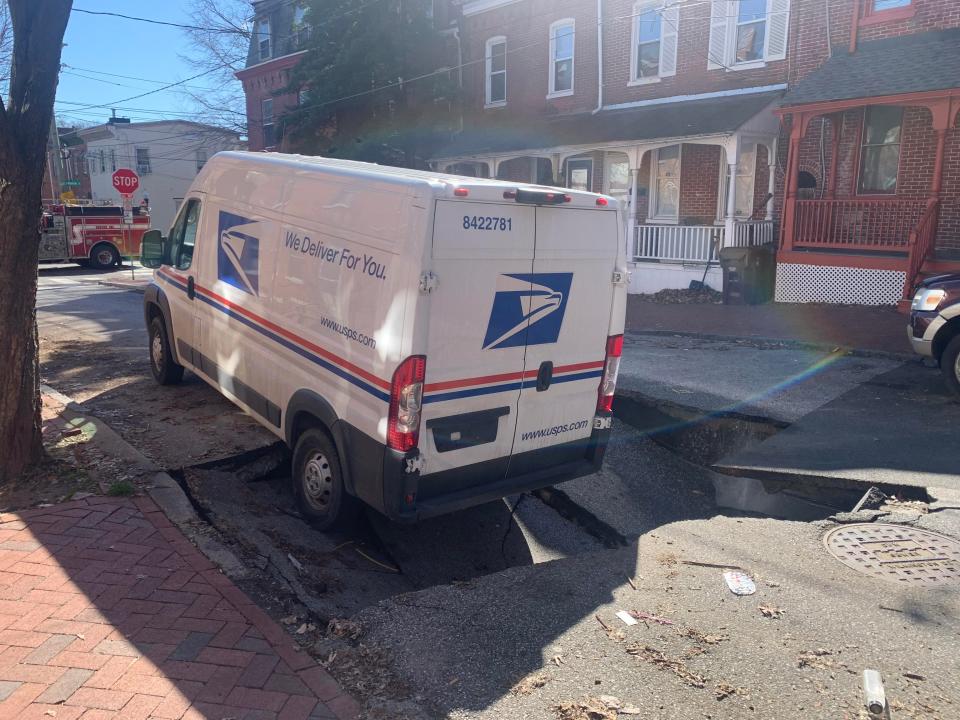Why Wilmington council wants to prevent foreclosures over unpaid water bills
Despite resistance from the city’s administration, Wilmington council members are considering a package of ordinances that would protect people from losing their homes over unpaid water bills.
The three ordinances proposed by Councilperson Shane Darby were introduced ahead of Mayor Mike Purzycki’s 2025 budget proposal, slated to be unveiled to city lawmakers on Thursday, and will be considered in the context of budget negotiations over the coming weeks.
The proposals would:
Prohibit Wilmington from including unpaid water, sewer and stormwater fees in foreclosure pursuits against customers who occupy the homes in question.
Exempt elderly and disabled residents, as well as homes with children under the age of 5, from having their water disconnected for nonpayment of water bills.
Create an affordable water system.
During a recent council Finance & Economic Development Committee meeting where the ordinances were passed out of committee, Wilmington leaders pushed back on the proposals, suggesting the plans would negatively impact the city’s sewer and water fund and overall finances.

Wilmington Finance Director Brett Taylor said water shutoffs and filing liens over unpaid water bills (which city officials refer to as “monitions”) on properties are “the only two enforcement arms” the city has to recover the unpaid bills.
“To take away any opportunity for us to look at these monitions is going to have an unintended consequence,” he said. “It may help in the very near term; in the long term for the water utility, it becomes a liability.”
The proposed protections for homeowners around unpaid water bills comes ahead of Purzycki’s budget proposal, which officials anticipate will include another combined water/sewer rate increase of 5.7% – the same increase customers saw last year. Stormwater rates are also expected to increase this budget season by 6% – the same as last year’s hike.
LAST YEAR'S BUDGET PROPOSAL: With deficit on horizon, Wilmington mayor proposes ticket tax, increased hotel tax
The city system services 36,000 customers, including 13,000 New Castle County properties.
Wilmington water rate increases
Darby stressed that with water/sewer rates projected to increase over the coming years, now is the time to help Wilmington residents who are struggling.
According to the city’s water/sewer fund financial plan presented to city lawmakers during budget discussions last year, water/sewer rates are projected to increase to 5.8% each year through 2029.

While Wilmington residents can expect 6% increases in stormwater rates for 2025 and 2026, those rates are forecasted to trend downward by 2027 to 4% and 3.5% in 2028 and 2029, according to the fund’s financial plan.
“Imagine the impact” of shifting water billing from quarterly to monthly on people who live on fixed incomes, Darby said. Plus, she said the city plans to continue to increase their bills.
“The practice of foreclosing on residential homes over water billing is inhumane. Every individual deserves the security of the home without the looming threat of homelessness over basic utilities,” Darby said. “This legislation is basically saying let’s not foreclose on someone’s home (when) including water or solely for water.”
Water shutoffs, foreclosures over unpaid water bills
In the last eight years, city officials say Wilmington has taken only 44 properties to sheriff’s sale over unpaid water bills.
Of those properties, 17 were owner-occupied, eight were commercial properties, six were rentals and nine were vacant properties, according to figures provided by the city's Finance Department to Delaware Online/The News Journal on Friday.
RECENT: Wilmington apartment building declared unfit after owners fail to fix heat, provide hot water
For a property to reach a threshold for foreclosure, it must owe $10,000 or more in unpaid property taxes, utility bills and/or city Licenses & Inspections fees. That threshold is the same whether it’s a commercial or residential property, Taylor said.
“That’s a handful, less than 10 a year, and those utilities were pretty significant,” he said.
Darby’s ordinance would stop the city from foreclosing on owner-occupied homes when unpaid water bills is the driving force behind the sheriff’s sale.
According to figures provided by the city, it issued 869 water shutoff notices in 2022 and shut off water to 199 properties. A majority of those were turned back on after a payment was made or payment plan was set up, said John Rago, the mayor's deputy chief of staff. Only 32 properties remained shut off that year.
Figures for 2023 were similar: 843 notices were sent to customers and 114 properties had water shut off. Only 20 of the properties' water supply remained off.
Wilmington resident Christian Willauer, who also is part of the Fines & Fees Task Force, stressed that the number of properties that would fall into the proposed protections is small, and helping them "wouldn't bankrupt the city."
“I think the point of this legislation is to solve the problem for the small number of people who are heavily impacted,” she said. “While there are unintended consequences for the water system, there are also unintended consequences as a result of foreclosure action.”

Another ordinance Darby proposed would prohibit the city from shutting off water to homes where children under 5 live, as well as to homes with older adults or disabled people on fixed incomes. It would not absolve customers of their financial obligation, the councilwoman stressed.
When water is shut off to a property, it leads to a home being declared “unsafe and unfit,” forcing the inhabitants to leave the home until water can be turned back on.
“It costs a society more to deal with families who are unhoused than to try and keep them housed. When we talk about capacity, resources, time, agencies and organizations – all that plays into rehousing a family,” Darby said. “The cost to us as a city to keep someone in a home does not compare.”
Why the utility assistance program isn’t enough
Taylor and other city administrators pointed to Wilmington’s utility assistance program as the solution and path forward to addressing unpaid water bills. The legislation, he said, could have “unintended consequences,” among them negatively impacting the city’s bond rating.
“We think it’s a better posture for us to go ahead and negotiate with customers, and meet them where they are. Everybody's situation is different,” Taylor said. “By having a broad brush approach to this, you’re going to take away that differentiation.”
But council members and people who spoke during the council committee’s public comment period stressed how difficult it is to get in touch with someone from the city to get on a payment plan, and emphasized that a resident must be at least three months behind on water bills and meet an income threshold to qualify.
The utility assistance program was expanded in 2021, utilizing federal funding as well as additional allotments set aside by Wilmington City Council to fund the program. The payment plans typically require a customer to pay half of what is owed, which Darby and others pointed out may be unattainable for those already struggling.
LEARN MORE ABOUT THE UTILITY ASSISTANCE PROGRAM OR APPLY FOR FUNDING
However, of the 5,900 customers who owe $500 or more in outstanding payments, only 495 people have been assisted, figures that concerned Councilwoman Latisha Bracy.
“Why? What’s going on? Is it a lack of communication? Do people not know that this money is out there, or are people applying and they are getting denied?” she said. “It would be interesting to figure out where the holdup is.”
Darby says this is why she has also proposed Wilmington develop an affordable water system that would help prevent customers from falling behind on bills in the first place.
“This is again a step in moving forward to being a just city. I have no question about this,” said Chris Johnson, chairman of the council’s Finance and Economic Development Committee. “This is a no-brainer in terms of how we can get better. It’s an examination of how we can do better in this city.”
Got a tip? Contact Amanda Fries at afries@delawareonline.com, or by calling or texting 302-598-5507. Follow her on X at @mandy_fries.
This article originally appeared on Delaware News Journal: Wilmington council wants to stop foreclosures over unpaid water bills

